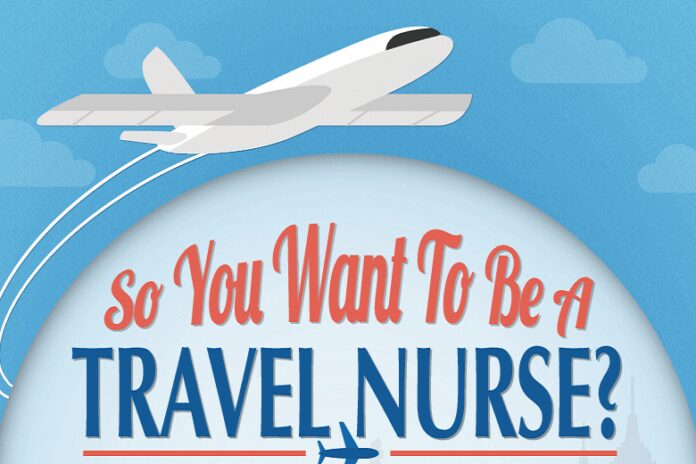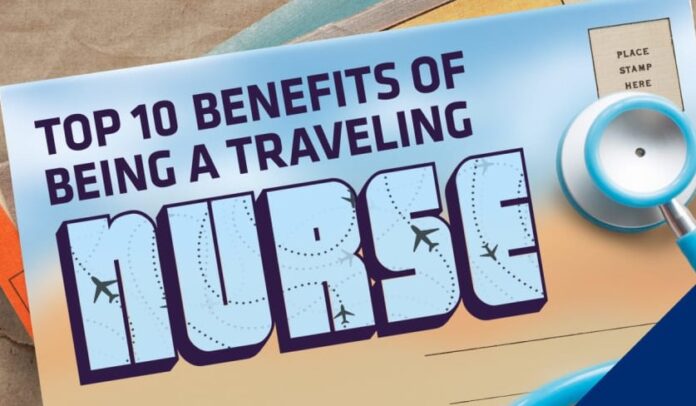Are you looking for a job in the medical industry?
If so, you might want to consider a career as a traveling nurse. After all, this is one of the most exciting and in-demand jobs in the healthcare field. Becoming a traveling nurse can be a rewarding and fulfilling career choice.
Here we provide a complete guide to the benefits of becoming a traveling nurse. Keep reading to learn more.
1. Flexibility

One of the biggest benefits of becoming a traveling nurse is the flexibility it offers. As a traveling nurse, you have the ability to work in a variety of locations and settings and can choose how long you want to stay in each location. This can allow you to create a work schedule that suits your lifestyle and personal preferences.
2. Higher Pay
Traveling nurses typically earn higher pay than traditional full-time nurses. This is due in part to the need for nurses in different locations, which can result in higher pay rates and bonuses. Also, the travel nurse bill rate and independent nurse contractor bill rate are typically higher in most countries.
3. Travel Opportunities
One of the most obvious benefits of becoming a traveling nurse is the opportunity to travel. By accepting travel assignments, you have the chance to explore new places and experience different cultures, all while earning a living.
4. Enhanced Skills

As a traveling nurse, you have the opportunity to work in a variety of settings and with different patient populations. This can help you develop a broader range of skills and experience that can enhance your professional development.
5. Job Security
Because of the high demand for nurses in different locations, becoming a traveling nurse can offer more job security than traditional nursing roles.
When you’re ready to buy nursing outerwear, you can look here for more information.
6. Resume Building
Working as a traveling nurse can enhance your resume. That’s because it demonstrates your ability to adapt to new environments and work with a variety of patients and healthcare professionals.
7. Personal Freedom
As a traveling nurse, you have the freedom to choose where you want to work and how long you want to stay. This can offer a level of personal freedom and independence that is not always available in traditional nursing roles.
8. Housing and Travel Benefits

Most travel nurse agencies offer housing and travel benefits as part of their compensation package. This can include free housing, reimbursed travel expenses, and per diems for food and other expenses.
9. Professional Networking
As a traveling nurse, you have the opportunity to meet and work with a variety of healthcare professionals. This can help you expand your professional network and potentially open up new career opportunities in the future.
10. Personal Growth
Traveling and working in new locations can be a transformative experience. It can help you develop new perspectives, become more adaptable, and increase your self-confidence.
Becoming a Traveling Nurse

There’s no denying that a career in the healthcare industry can be incredibly fulfilling. Choosing a career as a traveling nurse means you’ll enjoy a degree of flexibility and high pay that few others will ever experience.
Please continue exploring the blog to find more great content filled with useful tips and advice for readers of all ages.
Travel nurses sign a contract to fill a temporary position that can last several days, weeks, months, or longer with possible opportunities including international work. When contracts expire, travel nurses either extend their stay at the same location or move on to a new destination and opportunity. The length of their contracts can vary, although most placements are between 8 and 26 weeks. Some travel nurses may find a temporary assignment they like and turn it into a full-time position.
How much can you make this a travel nurse?
BLS does not have specific information on travel nurses. However, typical RN data is a good starting point. According to the BLS, the average salary for a registered nurse is $82,750 per year ($39.78 per hour).
Requirements for the Traveling Nurse

If you are ready to become a traveling nurse, you should be aware of some travel nurse requirements. For starters, you need to be a registered nurse (RN) with at least some hospital experience. Many hospitals prefer nurses with a Bachelor of Science in Nursing, such as the one offered at Gwynedd Mercy University. If you already have a bachelor’s degree, you can earn an accelerated bachelor’s degree in nursing, which is an accelerated degree for individuals who already have a bachelor’s degree in another field. After earning your bachelor’s degree, you can go on to earn a graduate degree in nursing.
In addition, you must ensure that you are certified to practice in the state where your assignment is. If your home state is part of the Nurse Licensure Compact – Pennsylvania is not – then you are eligible for multistate licensure. However, since NCLEX is a nationally recognized licensure exam, obtaining licensure in another state should not be too difficult. Also, your staffing agency may be able to provide some assistance. Rest assured that the travel nurse certification licensure requirements won’t delay your new career as a travel nurse!
What Education Does a Travel Nurse Need?

Travel nurses generally must have at least one year of experience working as an RN. While you can become an RN without a degree, most nursing positions require bachelor’s degrees, especially travel positions. WGU’s online programs allow current RNs to earn a bachelor’s or master’s degree while working. This degree can set you apart from the competition, and help you land the travel nurse position of your dreams. Similarly, WGU offers licensure in some states for RNs with a bachelor’s degree.
Also, don’t be surprised if you are assigned tasks or patients that other nurses don’t want. It is common for full-time nurses to put travel nurses on a short probationary period to prove they have the necessary skills. This is where experience and certification come in. If you can walk in with the confidence that you can work with any patient you’re assigned to and can do so under pressure, you’ll be fine in no time.









